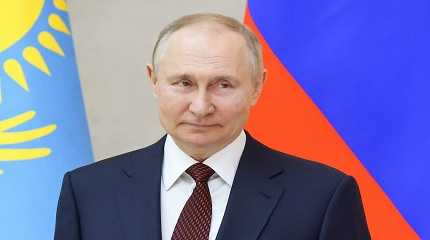
KYIV, Feb 23 (Reuters) - Ukraine said its forces had repelled Russian assaults along the length of the front line on Thursday on the eve of the war's anniversary, as President Vladimir Putin, empty-handed after a bloody winter offensive, talked up Russia's nuclear arsenal.
After a series of strident speeches in the runup to the anniversary of his invasion, Putin announced plans on Thursday to deploy new Sarmat multi-warhead intercontinental ballistic missiles this year. Earlier this week he suspended Russia's participation in the START nuclear arms control treaty.
"As before, we will pay increased attention to strengthening the nuclear triad," said Putin, referring to nuclear missiles based on land, sea and in the air.
"We will continue mass production of air-based hypersonic Kinzhal systems and will start mass supplies of sea-based Zircon hypersonic missiles," Putin said in the remarks issued by the Kremlin early on Thursday.
Ukraine and its Western allies have brushed off the nuclear posturing as a diversion from a failing Russian military campaign on the ground, a year after Putin launched the biggest land war in Europe since World War Two.
The last weeks have seen Russia mount infantry assaults across frozen ground in battles described by both sides as the bloodiest of the war.
Western officials said they believed Russia had planned an offensive to capture new territory ahead of the anniversary, using hundreds of thousands of reservists conscripted in recent months to give Putin a victory to announce.
Moscow's forces have made progress trying to encircle the small city of Bakhmut, but have failed to break through Ukrainian lines to the north near Kremmina and to the south at Vuhledar where they have taken heavy losses assaulting across open ground into the teeth of Ukrainian artillery.
Ukrainian forces repelled 90 Russian attacks in the northeast and east over the past 24 hours, the military said early on Thursday.
Ukraine has shut some schools for the war's anniversary in anticipation that Moscow might launch long-range missile attacks to mark the date. But Kyiv officials said they believe Moscow no longer has the capability for a dramatic show of force.
"Nothing unusual will happen. Usual (Russian) effort... A small missile strike is planned," Kyrylo Budanov, the head of Ukraine's military intelligence, told the Ukrainska Pravda news website in an interview.
"23-24 (February), they have two dates. Believe me, we have experienced this more than 20 times," he said.
Britain's military said in a daily intelligence update that Moscow could be planning another large-scale assault on Vuhledar, despite costly failed attacks there earlier this month. It said last week that two full brigades of thousands of elite Russian marines had been rendered combat ineffective because of massive losses there.
With no major battlefield victories to report in time for the anniversary, Putin has instead turned to nuclear rhetoric, announcing in a major speech on Tuesday that Russia would suspend participation in the New START arms control treaty.
The practical implications appear limited: inspections under the treaty had already been halted over the war. A senior defence official said Moscow would stick to the treaty's limits on missiles and continue to notify Washington when it moves them.
U.S. President Joe Biden, who upstaged Putin this week by journeying unannounced to Kyiv and then giving a landmark speech of his own to a crowd in Warsaw, called the suspension of START a "big mistake" but said on Wednesday: "I don't read into that that he's thinking of using nuclear weapons or anything like that."
The RS-28 Sarmat missiles, dubbed "Satan 2", whose deployment Putin announced on Thursday, were first unveiled in 2018 and already supposed to have been deployed last year.
CNN reported that the United States believes Russia carried out a test of the Sarmat just before Biden visited Ukraine, but that the test failed. The Russian defence ministry has not commented on that report.
Putin also promised to produce more hypersonic missiles, which fly too fast to be shot down. Russia is due to begin military exercises with China in South Africa on Friday and has sent a frigate equipped with them.
Russia still controls nearly a fifth of Ukraine, despite losing swathes of territory in major battlefield setbacks last year after failing to capture Kyiv at the outset of its "special military operation".
Tens of thousands of Ukrainian civilians and troops on both sides are believed to have died in the past year. Russian artillery has destroyed Ukrainian cities and set millions of refugees to flight.
Ukrainian troops have stuck mainly to defence since their last offensive in November, hoping that Russian forces replenished with reservists will be exhausted in attacks. Kyiv has meanwhile received pledges of Western weapons for a planned counter-offensive later in 2023.
In New York, the U.N. General Assembly is expected to mark the eve of the invasion's first anniversary by passing a resolution demanding a halt to it. Ukraine hopes to deepen Russia's diplomatic isolation by seeking yes votes from nearly three-quarters of countries.
Moscow, which claims its invasion was justified by concerns about its security, calls the text unbalanced.
"Russia violated the U.N. Charter by becoming an aggressor," Ukraine's Foreign Minister Dmitro Kuleba said at the United Nations. U.N. Secretary-General Antonio Guterres on Wednesday denounced Russia's invasion as a violation of the founding U.N. Charter and international law.
"We have heard implicit threats to use nuclear weapons. The so-called tactical use of nuclear weapons is utterly unacceptable. It is high time to step back from the brink," Guterres said.




